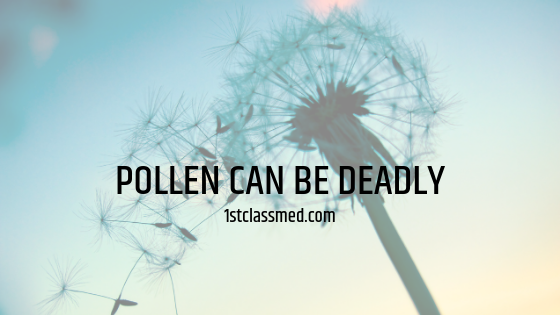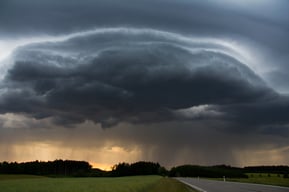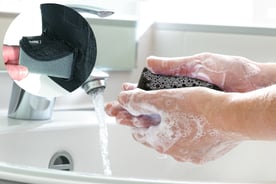
Let’s face it. Unless you’re a bee, pollen is not your friend.
Recently British officials issued an alert for respiratory patients about the ominous sounding and potentially fatal, “thunder fever”. A condition dubbed, thunder fever exists when a combination of low pressure systems and humidity that initiate thunder storms coincide with a high pollen count. According to the Herald Sun, 8,500 people were hospitalized for asthma attacks after thunderstorms in 2017. 9 of those people actually died from their attacks.
Pollen in a Rainstorm
In meteorological terms, what is known as a low pressure system causes rain clouds to  form. When air is descending from high regions it causes the wind to blow outward, thus allowing pollen to dissipate more readily. This is known as a high pressure system. Low pressure systems are created when air is being drawn up from the ground and low hanging thunderclouds prevent that dissipation.
form. When air is descending from high regions it causes the wind to blow outward, thus allowing pollen to dissipate more readily. This is known as a high pressure system. Low pressure systems are created when air is being drawn up from the ground and low hanging thunderclouds prevent that dissipation.
Air near the ground is denser and also warmer. As that moist air rises it loses density and begins to cool, causing the water to condense. This condensing water forms clouds, and depending on how much moisture they have absorbed, this is a recipe for a rainstorm.
As air is moved up it picks up pollen and other allergens from the ground. Pollen grains absorb moisture that is in the air and burst into millions of tiny particles. Since there is very little wind, the particles are free to drift and spread where these fine particles are easily and deeply inhaled into the lungs.
For those with pollen sensitives, this causes inflammation and irritation triggering a histamine response. Symptomatically that means eye watering, sneezing, coughing, and excess mucous production. For those with COPD or asthma it can mean exacerbation and risk of hospitalization.
Reduce your Risk of Hospitalization

Local newspapers and news channels report on pollen levels. There are several free apps to download to your phone that report on allergen risks as well. If you type in “pollen report” to google, your local report should come right up.
Especially during this time of year when pollen counts are usually high and there is a risk of almost daily thunderstorms, it is important to remain aware of when exacerbation danger exists.
It’s essential that you know your triggers. Many allergy alerts such as the one on weather.com, breaks down the levels of different kinds of pollens such as tree, grass, and ragweed. This site also has a breathing comfort rating for your reference. Spring time is the most common time for allergies but keep in mind that summer brings increased grass pollen while weed pollen increases in late summer and fall.
- Plan your outdoor time accordingly. Early morning is peak pollen time so if you are planning to go outside, do it after 10 AM.
- Try to avoid going outside on windy days if the pollen count is high.
- Wear a hat and wash your hair daily to avoid any dust or pollen build up. Be sure your hair is clean before laying down on your pillow.
- If you walk your dog outside keep in mind that Rover is a pollen collector too. Brush and wash your pooch regularly during peak allergy season. Wipe them down with a damp cloth when they come back in from outside.
- Take off your shoes in the house to keep from tracking in any pollen or other allergens. Keep outdoor jackets clean and wash clothes regularly. Keep dirty clothes tucked away in a laundry room or in closed bag or hamper.
- Mop your wood and tile floors and regularly vacuum carpet and furniture to keep allergens at a minimum.
- Consider wearing a mask or scarf over your nose and mouth if you are going to be outside for an extended period of time.
- See your doctor about an allergy medication if symptoms are bothersome. If you are on medication be sure to take your dosage before going outside. The idea is to avoid an allergy attack altogether, not stop one in progress.
- Consider taking a vacation somewhere that is less affected by pollen. Head to the beach and tell everyone it’s for medicinal purposes!
- Keep windows closed during peak pollen times.
- Use a vacuum with a HEPA filter.
- Make sure the filters for your air conditioner or swamp cooler are clean and changed regularly.

By taking these precautions you can enjoy all the colors and fun of spring without risking your health. If you are unsure what your allergy triggers are be sure to discuss this with your physician. They can give you an allergy test for both airborne and food allergies so that you can better manage your health.
 should always be kept clean for optimal use. This is especially important during allergy season.
should always be kept clean for optimal use. This is especially important during allergy season.



 form. When air is descending from high regions it causes the wind to blow outward, thus allowing pollen to dissipate more readily. This is known as a high pressure system. Low pressure systems are created when air is being drawn up from the ground and low hanging thunderclouds prevent that dissipation.
form. When air is descending from high regions it causes the wind to blow outward, thus allowing pollen to dissipate more readily. This is known as a high pressure system. Low pressure systems are created when air is being drawn up from the ground and low hanging thunderclouds prevent that dissipation.

